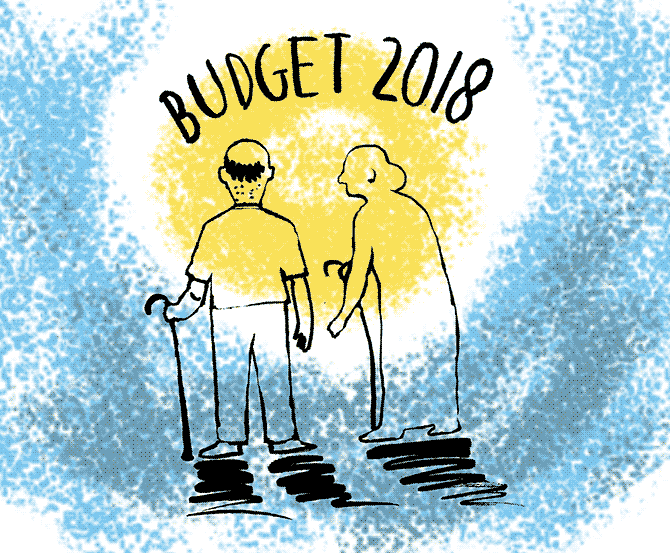Thanks to Budget 2018, seniors can invest more and also save more.
Tinesh Bhasin reports.
Illustration: Dominic Xavier/Rediff.com

For those in the lower tax brackets (5 and 20 per cent) who don't like the volatility that comes with equities, fixed-income instruments like fixed deposits (FDs) and Senior Citizens Savings Scheme (SCSS) have turned more attractive than debt mutual funds.
"Other than fixed-income debt instruments becoming attractive, seniors can now invest in Pradhan Mantri Vaya Vandana Yojana (PMVVY) that yields higher returns than fixed deposits," says Suresh Sadagopan, founder of Ladder7 Financial Advisories.
1. FDs attractive for lower tax brackets
Most senior citizens invest their money in fixed deposits or post office savings schemes and live off the interest earned on them.
Now, they will be able to claim a deduction of up to Rs 50,000 on the interest earned on these deposits.
The government has done this by introducing Section 80TTB.
If a senior citizen invests Rs 700,000 in State Bank of India's FD that carries 6.75 per cent, he will make Rs 47,250 a year and doesn't need to pay any tax on it.
Those investing in Post Office SCSS at the interest rate of 8.3 per cent also don't need to pay tax on Rs 600,000 worth of investment.
"While those in the 30 per cent tax bracket can also have investment in FDs up to Rs 700,000, for further investments they are better off in debt funds. Opting for regular income with a systematic withdrawal plan (SWP) is more tax efficient than monthly income through an FD," says Deepesh Raghaw, founder, PersonalFinancePlan.in.
Suppose you invest Rs 700,000 in a debt fund and get 7,000 units. When you withdraw partial units, there will be short-term capital gains tax only on the gains you have made on the withdrawn units.
For those in the highest tax bracket, the tax outgo is less than what they would pay on bank FDs.
2. Investment scheme revamped
Last financial year the government had introduced PMVVY, which is designed to provide a regular pension to senior citizens. It was earlier open for investment until May 3, 2018.
The Budget has now proposed to keep it open for investment till March 2020.
Apart from extending the scheme's investment duration, the limit of Rs 750,000 per senior citizen has also been enhanced to Rs 1.5 million.
A couple, if both are seniors, can double the investment amount with each one investing up to Rs 1.5 million in this scheme.
But if a senior gifts money to his wife to invest in the scheme, the gains will be added to the husband's income.
The scheme provides an assured return of 8 to 8.3 per cent a year, depending on the periodicity of payment. The interest earned, however, is taxable.
The maximum pension that an investor can earn has now doubled to Rs 10,000 a month.
This is at par with SCSS, which offers a similar return of 8.3 per cent a year. However, the interest earned in PMVVY scheme will not get the 80TTB deduction.
Senior citizens should look at this scheme once they have exhausted the SCSS limit.
3. Buy super top-up to increase health cover
Recently, many public sector insurers hiked the health insurance premium for senior citizens by 60 to 100 per cent.
Also, with medical costs rising at above 10 per cent every year their existing cover may be inadequate in the future.
Now, when seniors opt for a higher cover, they will also get a higher tax deduction of Rs 50,000 under Section 80D. Earlier, the limit was Rs 30,000.
A senior citizen looking at enhancing his cover can ask her/his insurer to increase the sum assured, and the premiums will rise in tandem, or s/he can buy a fresh senior citizen's policy that many insurers have launched recently.
But instead of these two, a better option is to buy a super top-up cover.
For a 70 year old, while the premium for a base policy with sum assured of Rs 500,000 would be in the range of Rs 25,000 to Rs 30,000, the top-up cover can be bought for Rs 11,500 to Rs 14,000.
The government has also raised the limit of deduction for medical expenditure in respect of certain critical illnesses to Rs 100,000 for all senior citizens, under Section 80DDB.
4. Overall impact
Apart from these reliefs, the government has also introduced a standard deduction of Rs 40,000 to all those who have a salaried income.
"Seniors, who have pension income can benefit as the pension is reported as salary income when filing returns," says Kuldip Kumar, partner and leader personal tax, PwC.
If you consider all the deductions available to senior citizens who also have a pension, the total taxable income will be Rs 140,000 lower than what they have at present.
If you take away the deduction available for critical illness, the taxable salary will still be Rs 100,000 lower compared to what they get now.
Now, seniors can invest more and also save more.










